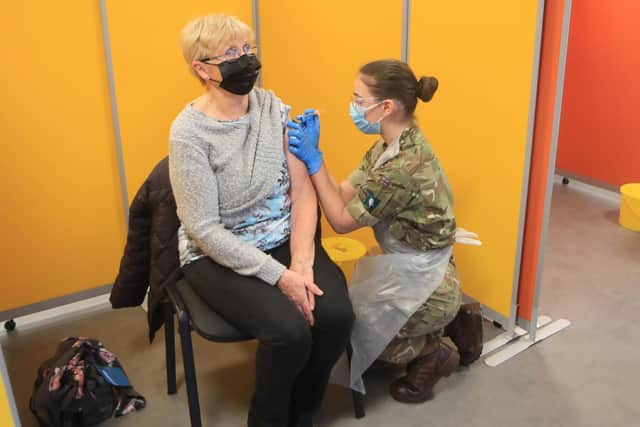UK secures 60 million extra doses of Pfizer/BioNTech vaccine to help with Autumn booster programme against coronavirus
Health Secretary Matt Hancock said booster shots were "the best way to keep us safe and free while we get this disease under control across the whole world".
And he said that while the hugely successful vaccination programme which has seen nearly a third of all adults given at least one dose was "bring back our freedom", the biggest risk to that was from a new variant.
Advertisement
Hide AdAdvertisement
Hide Ad

He said in a statement: “These further 60 million doses will be used, alongside others, as part of our booster programme from later this year, so we can protect the progress that we’ve all made."
The extra Pfizer/BioNTech jabs will be used alongside other approved Covid-19 vaccines for the booster programme. New data from Public Health England today shows that one dose of a Covid-19 vaccine reduces household transmission of the virus by up to half.
The Government says it will publish further details on the booster programme "in due course" and the final policy will be informed by advice from the Joint Committee on Vaccination and Immunisation (JCVI) and the results of clinical trials studying the use of different combinations of approved Covid-19 vaccines.
It comes as people aged 42 and over in England were called to come forward to get their vaccine, while one in four (25 per cent) UK adults have had their second coronavirus jab.
Advertisement
Hide AdAdvertisement
Hide AdMeanwhile, a senior health official said people who have received two doses of a Covid-19 vaccine are being told to keep up social distancing partly due to British culture.
Dr Mary Ramsay, head of immunisation at Public Health England (PHE), told MPs there is a desire for the population to move together - in contrast to the US, which is allowing fully vaccinated people to meet indoors without the need for social distancing.
Dr Ramsay told the Commons Science and Technology Committee the UK's policy of leaving up to 12 weeks between vaccine doses - a move she said has saved lives - means the UK is behind the US when it comes to fully vaccinated individuals.
Overall, the UK has secured access to 517 million doses of eight of the most promising Covid-19 vaccines. These are Pfizer/BioNTech for 100 million doses, Oxford/AstraZeneca for 100 million doses, Moderna for 17 million doses, Janssen for 30 million doses, Novavax for 60 million doses, Valneva for 100 million doses, GlaxoSmithKline and Sanofi Pasteur for 60 million doses and CureVac for 50 million doses.
Advertisement
Hide AdAdvertisement
Hide AdGovernment data up to April 27 shows that of the 47,540,984 jabs given in the UK so far, 33,959,908 were first doses - a rise of 116,328 on the previous day.
Some 13,581,076 were second doses, an increase of 379,265.
A further 29 people had died within 28 days of testing positive for Covid-19 as of Wednesday, bringing the UK total to 127,480. The Government also said that, as of 9am on Wednesday, there had been a further 2,166 lab-confirmed cases in the UK. It brings the total to 4,411,797.
The Government says it has already hit its target of offering everybody in cohorts 1 to 9 - those aged 50 and over, the clinically vulnerable and health and social care workers - a first dose of the vaccine by 15 April and remains on track to offer a jab to all adults by the end of July.
Data from the ONS and Oxford University shows that Covid-19 infections fell significantly by 65 per cent after the first dose of the Oxford/AstraZeneca or Pfizer/BioNTech vaccines, rising further after the second dose.
